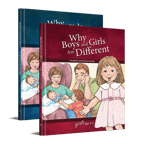Our children face numerous challenges today, such as topics of conversation happening before they are ready to hear them, pressures regarding their identity, and more. When it comes to conversations about sexual identity and faith, the best we can do is continue to point our children back to God and His Word. In this post, we are going to cover specifics about the new Learning About Sex Education Curriculum and how it equips parents or guardians, teachers, and children to be in the world but not of it.
Ages 3–5
When it comes to talking about identity and sexuality, the best place we can start with young children is right in the Bible. In the curriculum for ages 3–5, boys and girls will learn how they are different in some ways and how they are the same in others. Boys and girls will learn each person is God’s special child and how much He loves them.
God gifted each of us with our bodies and created each person to be unique. He has a purpose for every person’s life. This is a good time to start explaining what certain parts of our body are and how everyone’s body is different.
Children should be taught to love and cherish their bodies in the same way their heavenly Father loves them. They should learn how God purposely designed each family so we may learn and care for one another. Use this book to introduce what marriage is and how babies grow. Start gently introducing these topics as they continue to grow and understand Why Boys and Girls Are Different and all are saved and loved by Christ.

The Why Boys and Girls Are Different for Ages 3–5 books are recommended throughout these lessons.
Ages 6–8
Each child who enters his or her family is a gift straight from God. The topic of explaining how children come to us is a touchy subject, and you might be thinking “Can’t I just keep telling the story about the stork?” But the day will come when your child will need to know, and he or she will need to hear it from you. This book begins to introduce the topic of conception in a gentle and age-appropriate way.
Kids are so interested in learning at this age and are yearning to absorb every new fact. These kids are too young to learn about everything. But they will be interested in learning about where babies grow and the stages of their development while in utero.
Children can learn about the stages of growth they went through before they were born. Start talking about these subjects with your kids now so you can begin building a foundational understanding that is grounded in the Lord.
The Where Do Babies Come From? for Ages 6–8 books will guide learners through these topics.
Ages 9–11
Giving a child a talk about the birds and the bees can be uncomfortable for you and for them. But it is a conversation that someone needs to have with them before they encounter these topics on the internet or hear about them from peers.
Start introducing these topics in a faith-based way. The Lord designed us as male or female and the changes boys and girls will experience at this age are similar in some ways and quite different in others. Prepare children for the upcoming or current changes they are experiencing and to help them know these changes are normal. The Lord will be with them through every new change and phase they enter and His love for them will never cease.
As children are entering adolescence, we must point them toward their heavenly Father to help guide them. He reminds them that we are all His children, created and loved by Him. Adolescents might be learning new things and changing both physically and mentally, but our identity in Christ will never change.
The How You Are Changing for Ages 9–11 books are recommended to use with these topics.
Ages 12–14
Being a preteen can be challenging. Youth may start to have feelings toward the opposite sex and they should know this is normal. We have all gone through a stage when we start to notice more about the opposite gender such as how they look, dress, and act toward us. God purposely created people of two genders to love and support one another as partners.
Share the specific roles God created for males and females at this stage as youth begin to think about dating or start to date. God created each of us in His own image and wants us to treat ourselves and others with respect. This includes practicing abstinence and honoring God's plan for marriage.
There may be times that youth feel pressured to do things that are contrary to God's will for them. Remind them the plans God has for their bodies—they can trust Him and remember He knows what is best for them. Share these facts with children to help them establish Christ-pleasing friendships and relationships.
God loves each of us no matter the stage or changes we are going through. Remind youth that the Lord wants the very best for us and gives us grace, identity, and all that we need. He is there whenever we need Him and we should never hesitate to lean on Him when we are struggling.
The Sex and the New You for Ages 12–14 books can be used to guide preteens through these new stages.
 The Learning About Sex Curriculum is a tool to guide leaders and students through these topics. The first two books in the Learning About Sex series, Why Boys and Girls Are Different for Ages 3-5 and Where Do Babies Come From? for Ages 6–8, are needed to complete the curriculum. The books also include topics that are best addressed at home. The other books in the series can be used to supplement student learning.
The Learning About Sex Curriculum is a tool to guide leaders and students through these topics. The first two books in the Learning About Sex series, Why Boys and Girls Are Different for Ages 3-5 and Where Do Babies Come From? for Ages 6–8, are needed to complete the curriculum. The books also include topics that are best addressed at home. The other books in the series can be used to supplement student learning.



























